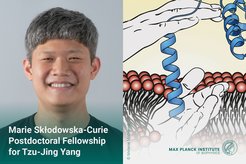Marie Skłodowska-Curie Postdoctoral Fellowship for Tzu-Jing Yang
Yang investigates the journey of membrane proteins during their assembly in the cell
Tzu-Jing Yang, postdoctoral researcher in the group of Melanie McDowell at the Max Planck Institute of Biophysics, receives one of the fiercely contested Marie Skłodowska-Curie fellowships of the European Union. In his project, he will study a special cellular pathway regulating the synthesis and delivery of integral membrane which perform important physiological functions and often serve as drug targets.
Text: Katharina Kaefer

Integral membrane proteins (IMPs) account for about 30 % of the eukaryotic proteome and span cellular membranes fully or partially. They are involved in a variety of fundamental cellular processes such as material transport, cellular communication or energy transfer and, thus, often serve as targets for medical drugs. During their production, IMPs undergo a journey with several stops until they are correctly incorporated into their target membrane and function properly. This journey begins in the cytosol where the cell’s “protein factory” – the ribosome – starts to assemble the IMPs according to a blueprint. Then, the IMPs are sent to the endoplasmic reticulum (ER) and inserted into its membrane where they are folded and processed to be finally delivered to their destination.
“The IMPs are given specific signals in the cytosol, like post-codes,” explains Yang. “They are transported to the ER with the help of ‘postman’ proteins which specifically recognize these signals, and then ‘sewing machine’ proteins will take over and sew the IMPs into the ER membrane.”
Due to their diverse functions, different IMPs show totally different biochemical properties and are therefore delivered to the ER by different tailored pathways, many of which are not completely unraveled yet. In his project, Yang will investigate one of them, the so-called “SND pathway” which not only delivers a special class of IMPs to the ER but also serves as an alternative route for a broad range of other IMPs in case of impairments in their regular delivery pathways. “The complete understanding of such biochemical processes through basic research frequently contributes to a better understanding of diseases and physiological dysfunctions,” concludes Yang.
Marie Skłodowska-Curie Fellowship is a Prestigious Achievement for Scientists
The Marie Skłodowska-Curie Actions of the European Union support the career of talented early career researchers who move abroad to gain experience in other countries and fosters excellence in science.
Yang prevailed in a highly competitive pool of applicants: Only about 17.5 % of applications were accepted in 2023.
After having completed his Master’s studies at the National Taiwan University, Yang started his doctoral training in biophysics and structural biology at the Institute of Biochemical Sciences at the same University. In his PhD project, he worked on the nucleocytoplasmic trafficking of tumor suppressors and studied receptor recognition and immune evasion of coronaviruses.
One year ago, he joined the group of Melanie McDowell as a postdoctoral fellow to study membrane protein biogenesis.

Further Reading
Press Releases of the European Commission:
MSCA supports doctoral training and postdoctoral fellowship programmes with €95 million
Marie Skłodowska-Curie Actions award €257 million to postdoctoral fellows in 2022













